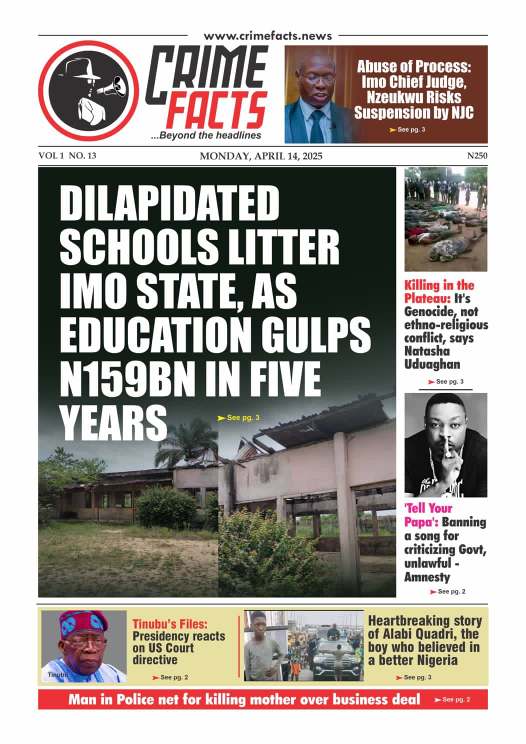
By Chris Ekpenyong
Like a patient who has undergone numerous surgeries and rehabilitative procedures under the supervision of surgeons and medical consultants for years, yet with no recovery in sight but a rather deteriorating condition laced with permanent bodily scars as evidence, the economy of Nigeria has always been under the knife.
It has been a history of serial diagnosis, proffered solutions and futile actions undertaken by successive administrations.
Unfortunately, healing and recovery remain elusive
As we navigate this complex landscape of our nation’s economic challenges, we must address key sectors to catalyze sustainable growth and development. The current economic situation in Nigeria demands a holistic strategy, focusing on investment in power, industries, agriculture, and security. By fortifying these pillars, we can pave the way for a prosperous future.
First, let us examine the critical importance of investing in power infrastructure. Access to reliable electricity is fundamental for industrialization, commercial activities, and overall economic productivity. Take, for instance, the success story of South Korea. Through strategic investments in power generation and distribution, coupled with efficient governance, South Korea transformed from a struggling economy to a global powerhouse within a few decades. Similarly, Nigeria can leverage its abundant natural resources to develop renewable energy sources and modernize its power grid, thereby attracting investments and fostering economic growth
The erratic power supply in Nigeria is generally believed to be the bane of economic and industrial development in the country.
Many factors including government inconsistent and misguided power reform policies, inefficiency in power generation, transmission, distribution and consumption, and the incompetent workforce of energy companies have been the reason for the near collapse of the sector.
Nigeria is Africa’s largest economy but also has one of the widest energy gaps in the world.
With a growing population, Nigeria urgently needs to improve its power sector.
The country’s current installed capacity is reported at 12,500 megawatts, but in practice is only 3,200 megawatts.
Government’s aim is to boost electricity access from 45% today to 90% by 2030 which will drive even more demand.
Government privatized part of the power sector in 2013, hoping to promote efficiency, attract private investment, and increase generation, but this has yet to deliver results.
The power problems of Nigeria are littered at every one of the three tiers of the power sector; generation, transmission and distribution. Therefore, solving electricity problems in Nigeria has to go beyond the oratory. It requires policies, capital infrastructure investment and sustainable maintenance which must be vented at the three tiers.
There is a need for the country to have data-driven discussions on key solutions to the myriad of challenges facing the electricity sector.
The issues concern infrastructure, distribution of available megawatts of electricity generated and banking on alternate sources of energy to solve the country’s electricity challenges.
It is important to have solutions that are backed up by data and not just assumptions.
Transmission and distribution lines in Nigeria are dilapidated thereby causing an infrastructural gap for the power sector.
Some other issues facing the country’s electricity sector include poor gas supply and hydropower sources refusing to fire up as they ought to.
Nigeria is not producing enough to meet the growing demands in the country.
There is a need to have policies that help the energy sector and the importance of monitoring key players in the sector.
For instance, distribution companies fail to supply electricity appropriately. Even the electricity generated by Nigeria is not properly distributed
There is a need to monitor the distribution of electricity to customers to ensure that the power supplied to distribution companies is properly distributed in the ways that it should be. Also, distribution companies should be restructured in a way that allows retailers to take part in the distribution process of electricity.
For instance, many distribution companies do not even know when consumers are not enjoying power supply.
To ensure maximum distribution of the power generated in the country, there is a need to bring retailers into the play.
This way, distribution companies supply power to retailers who in turn make it available to consumers.
These retailers should be the ones responsible for billing and reaching out directly to consumers. We would be bridging a distribution gap by doing so and winning the confidence of consumers while utilising what we produce more appropriately.
In addition, there is a need for Nigeria to diversify its source of supply, we need to encourage renewable energy sources. More Nigerians need to be brought into using alternate power sources. We cannot rely on just one source of power, we must diversify and have a blend of non-renewable/renewable energy.
Nigeria has a population of over 206 million people and energy from the national grid is barely 4,500MW daily. There is a huge need to invest in energy in Nigeria. If this problem is solved, Nigeria is on its way to development
The nation should attract investment to the energy sector, and conduct power asset inventory and audits to determine priority investment needs across the value chain and funding to replace or repair assets.
Resolve long-standing government liabilities to the electricity sector and create fiscal rules for fuure payments to prevent debt buildup.
Increase the capital allocation for the Transmission Company of Nigeria (TCN), including an analysis of its budget performance. We should also consider privatization of the Transmission Company of Nigeria, TCN.
We should solve barriers in the gas-to-power value chain, launch a federal coordination mechanism covering gas supplies, generation, transmission, and distribution and enforce existing penalties for payment default along the value chain.
All these can be done while at the same time planning for renewable energy integration, completing the development of the 14 planned solar plants, investing in new grid infrastructure to facilitate the integration of intermittent sources and integrating mini-grids into DisCo networks to supply power to underserved areas.
Government should also boost revenue collection to support DisCo viability, update tariff schedule to synchronize the payment expectations in the Multi-Year Tariff Order (MYTO) and the financing plans of GenCos, TCN and DisCos, utilize data analysis to allocate available power, invest in new IT systems for DisCos to enable revenue collection, management, and transparency and conduct an independent assessment of the power sector value chain to ensure accurate estimation of costs for electricity delivery and tariff adjustments.
Furthermore, fostering public-private partnerships (PPPs) can facilitate the development of the energy sector. By incentivizing private investment through tax breaks, subsidies, and regulatory reforms, we can attract capital and expertise to accelerate the expansion of our energy infrastructure. Brazil’s successful implementation of PPPs in its energy sector has led to increased investment and improved service delivery.
All these can be achieved if the Mr President assemble the best minds from the power sector who have participated and understand the challenges and are prepared to proffer solutions to revive the sector, especially those who have had years of experience in rural electrification because every form of development will succeed if it’s done from bottom to top. Stable electricity should start from rural electrification
In economic development, mineral resources are the foundation upon which an industrialised economy is built, and industrialisation is essential if Nigeria is to reduce over-dependence on the oil industry – an industry which, despite the revenue it generates, employs just six per cent of the Nigerian labour for
When I was in the Nigerian senate a bill to establish a financial institution known as the Solid Minerals Development Bank had passed second reading at the Senate.
The bill, sponsored by Yakubu Oseni, seeks to accelerate sustainable socio-economic development.
It also seeks to boost the solid minerals sector and the quality of life of the people by providing financial and non-financial investments in
This will be a huge contribution to the mining industry.
Like the Bible said the resources of the earth are for all and they are beneath the ground. Restructuring and resource control is the only means to diversify our economy from oil.
* Ekpenyong, a former deputy governor of Akwa Ibom State, represented Akwa Ibom North-West Senatorial District in the Senate. He writes from Gestric Polytechnic, Obot Akara Local Government Area


